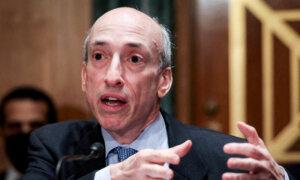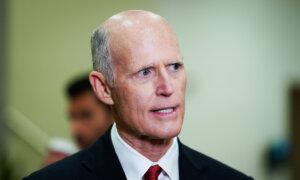The U.S. Chamber of Commerce objected to the Democrats’ request for the SEC to issue such a statement.
The U.S. Chamber of Commerce on Monday asked the Securities and Exchange Commission (SEC) not to follow a climate change-related request from 37 Democrat lawmakers. These lawmakers want the SEC to ask U.S. companies to follow different greenhouse gas reporting rules while the SEC’s own climate reporting rule is on hold due to ongoing lawsuits.
“Such a statement by SEC would be imprudent and unprecedented,” Tom Quaadman, executive vice president of the Center for Capital Markets Competitiveness at the U.S. Chamber of Commerce, wrote in the letter.
“Appropriately, SEC does not regularly publish notices to SEC registrants advising them to comply with other laws and regulations outside its remit, namely U.S. federal securities law. There is no mandate in the SEC’s authorizing statutes or precedent in the SEC’s 90-year history to do so,” he added.
Mr. Quaadman argued that a California climate reporting framework is being actively litigated, the EU framework is not yet in force, and a third reporting regime is not material for U.S. companies.
The lawmakers, by contrast, argued in their letter that the SEC has a history of providing climate-related guidance to companies and that the threats from climate change justify using the SEC’s administrative authority to spur companies into more urgent and robust climate action.
The climate-related reporting that the disclosure frameworks require include greenhouse gas emission levels and the impact of climate change-related events and mitigation measures on their business operations.
SEC’s Own Climate Rule On Hold
In March, the SEC finalized a rule requiring publicly traded companies to disclose climate-related information in their annual reports and registration statements starting in 2025.
The rule would require companies to disclose the impact of severe weather, carbon offsets, and renewable energy certificates in financial statements. Companies would also have to report on greenhouse gas emissions, governance of climate risks, the impact on strategy and business, risk management processes, and climate targets.
The rollout of the SEC rule sparked lawsuits from several Republican states, companies, and business groups seeking to block the regulation.
Opponents argued it would burdensome and expensive for companies and that it would trigger a flood of inconsistent information that would overwhelm investors rather than inform them.
Dissatisfied that the rule was on hold, dozens of lawmakers wrote a letter to the SEC on June 4, asking the agency to “vigorously defend” the now-stayed rule and “spare no litigation resources” in making sure it enters into force.
In the meantime, they also asked the SEC to issue a statement reminding U.S. companies that there are “alternative” climate reporting regimes that they should comply with while the SEC’s own climate rule remains frozen.
The alternative climate reporting regimes mentioned in the letter include one in California, another in the European Union (EU), and a third put out by the Delaware-based International Sustainability Standards Board (ISSB).
US Chamber of Commerce Opposed
The U.S. Chamber of Commerce expressed opposition to the SEC’s potential issuance of such a statement, arguing that asking U.S. companies to comply with regional or foreign climate regimes is either pointless, premature, or potentially harmful—pointing the ongoing legal challenge directed at such reporting mechanisms in court.
The California rule requires both publicly traded and private companies with over a billion dollars in revenue that operate in California to disclose both direct greenhouse gas emissions (known as Scope 1 and 2) as well as indirect emissions (Scope 3). This is more strict than the SEC rule, which applies only to publicly traded companies and excludes Scope 3 emissions.
Asking U.S. companies to comply with the EU Corporate Sustainability Directive is “similarly problematic,” Mr. Quaadman wrote, arguing that the first reports under this regime aren’t due until 2025 and many non-EU companies aren’t obligated to report until as late as 2029.
The EU’s Corporate Sustainability Reporting Directive (CSRD) also requires Scope 3 emissions data for both publicly and privately listed EU-based companies, as well as non-EU companies that undertake “significant activity” in the EU.
Finally, as regards the use of the ISSB climate reporting standards, the U.S. Chamber of Commerce said these “clearly do not apply” to U.S. domestic SEC-registered companies because these are for use in International Financial Reporting Standards (IFRS), which U.S. domestic registrants aren’t even allowed to use in their periodic reports to the SEC.
“In sum, the Chamber believes the best public policy is for the SEC to remain focused on statutes and regulations within its jurisdiction and to defer to other regulators around the world to enforce their own rules,” Mr. Quaadman wrote.
Original News Source Link – Epoch Times
Running For Office? Conservative Campaign Consulting – Election Day Strategies!


